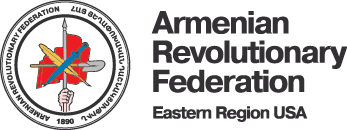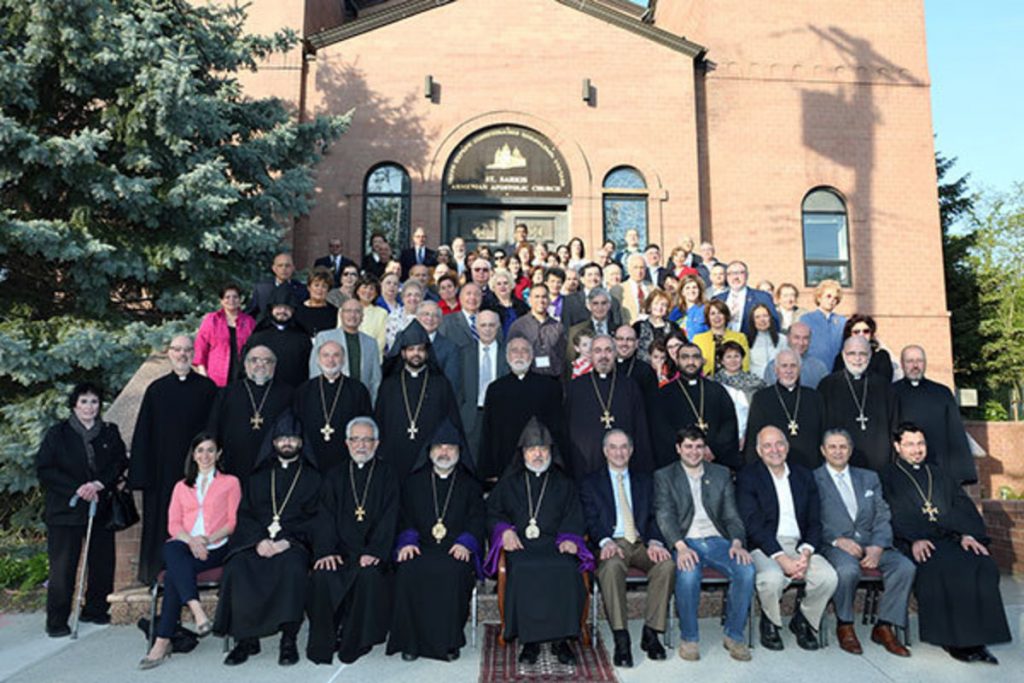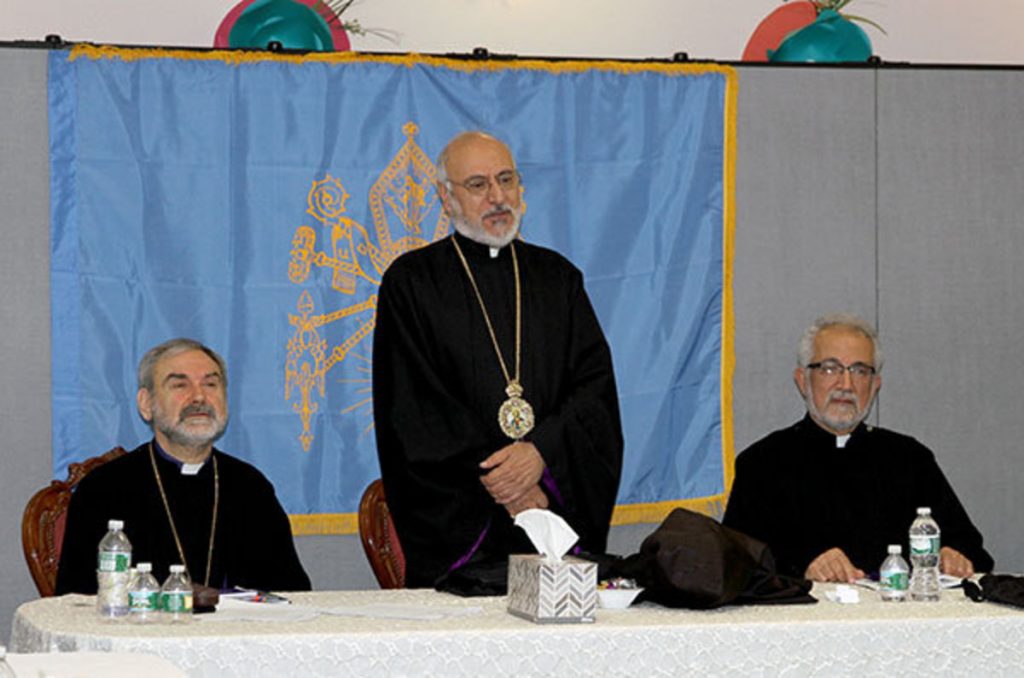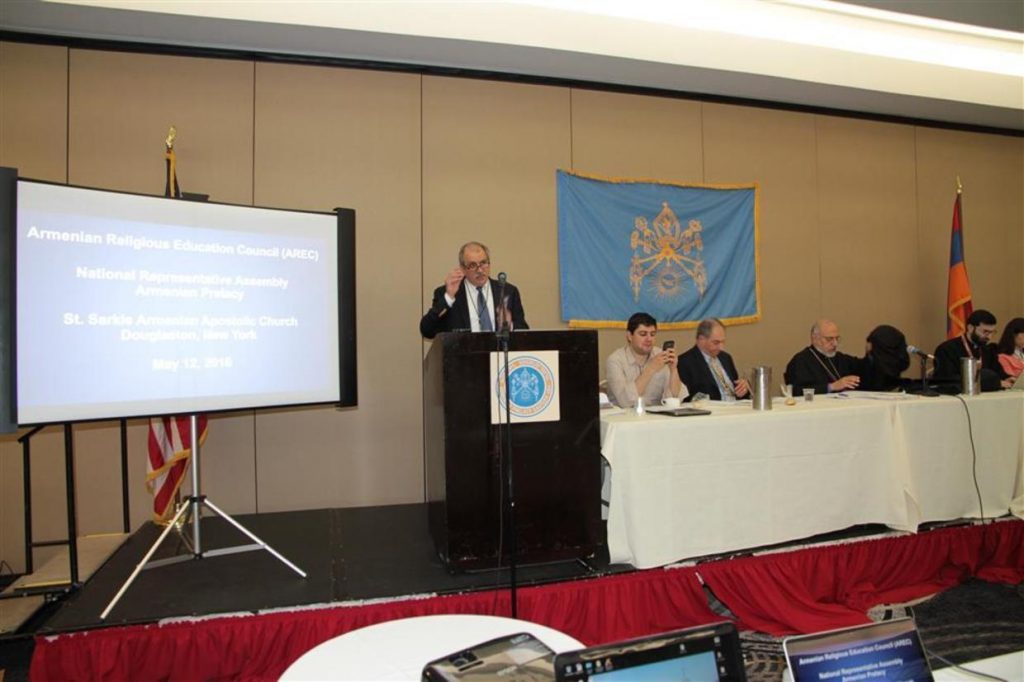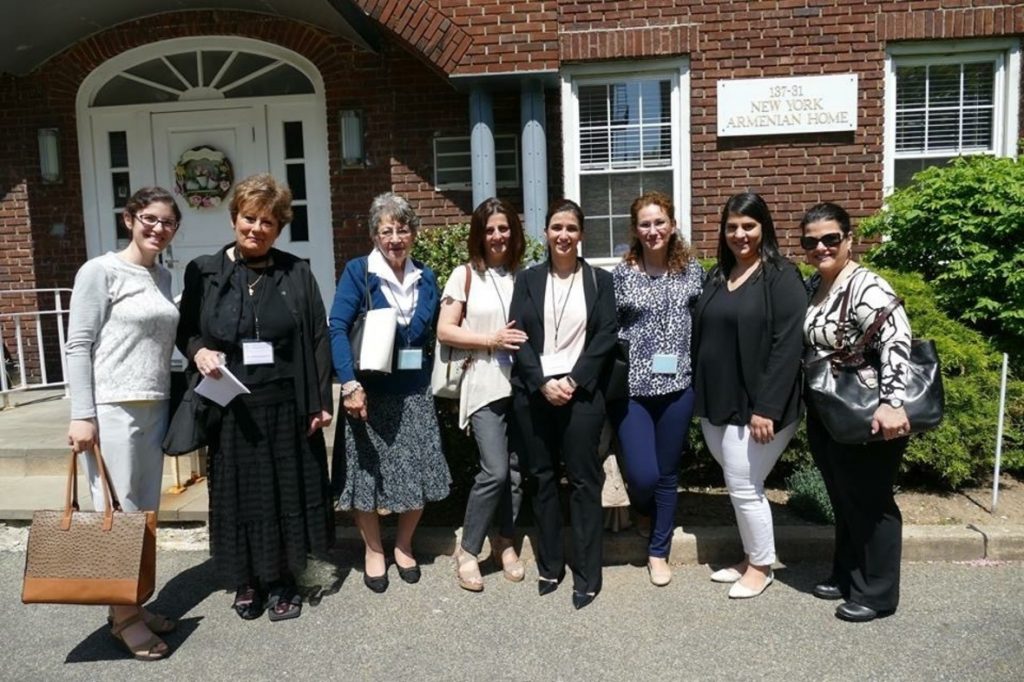National Representative Assembly 2016 Held May 12-14

DOUGLASTON, N.Y.—The Eastern Prelacy’s National Representative Assembly, hosted by St. Sarkis Church of Douglaston, New York, concluded on May 14. Clergy and lay delegates deliberated May 12-14, to review the past year and to prepare the agenda for the forthcoming year.
Archbishop Oshagan Choloyan set the tone of the Assembly with his keynote address that was devoted to service, in keeping with the “Year of Service” declared by His Holiness Aram I, Catholicos of the Holy See of Cilicia. Jack Mardoian from Chicago and Aram Hovagimian from Philadelphia were elected to serve as co-chairmen. Melanie Mesrobian and Very Rev. Fr. Sahag Yemishyan were elected to serve as secretaries.
This year’s Assembly included segments on the Armenian Religious Education Council (AREC), Armenian National Education Committee (ANEC), the Conference of Yeretzgeens, the National Association of Ladies Guilds, and Friday evening’s “Banquet of Recognition.”
Below is the Keynote Address by Archbishop Oshagan (translation).
***
I greet you with Christian and fatherly love on the occasion of the National Representative Assembly of the Eastern Prelacy of the Armenian Apostolic Church of America. I see in you the spirit of service that is the impelling power of your dedication to our Church and People.
At this first opportunity I express glory and thanks to our All-Bountiful Lord, who with His abundant mercy and sweet love blessed us to serve our glorious people, by teaching the Gospel and remaining faithful to our Church’s canons and traditions.
I am confident that all of you are aware that His Holiness Aram I, Catholicos of the Holy See of Cilicia, dedicated 2016 as the “Year of Service,” elevating the virtue of service and thus expressing thanks to our devoted children for their dedicated service.
Within a society, individuals in large measure demonstrate their presence and confirm their continuous participation with their dedicated service. With the growth of love of service, it becomes an inseparable part of character and personality—the oxygen of their existence. In this way they become an influential and undeniable presence, when especially in our ecclesiastical and national life, they devote their time, ability, and talent for the growth and advancement of this life. Centuries of experience—probably the secret key of existence—has showed us that we have endured all kinds of torrents, storms, massacres, and even genocide because of our faith and our cultural and intellectual treasures. The first step toward that giant result is service that elevates the individual and strengthens the collective entity. As St. Augustine said, “When you serve God, it is not God who becomes great; you become great.”
It is with this understanding that His Holiness watches us and expects to see in our ecclesiastical-national life individuals enriched and grown in spirit.
Since we are speaking about service generally, perhaps it is appropriate to see what areas we can devote ourselves and make our life of service worthy.
- Our Individual Life. Every person’s success begins and advances because of their preparation and formation. Children raised in healthy families see their parents’ care, love, and dedication, and grow up with the strength of the knowledge of values. Without doubt, in the future in interaction with people and organizations, they express that quality of life that is welcome and loved by all. The environment is what is important; education is the road to success. And the family is that environment—that sacred environment—that together with parents’ love, little by little, many types of virtues will progress: the sanctity of spiritual life, love of the Fatherland, Armenian culture, the transformative strength of language, literature and the arts. The family becomes holy and devoted like the Church and those who grow up in that sacred place are the faithful and devoted servants.
- Organizational Life. Individuals, besides belonging to a family, must also take part in the various structures, auxiliaries, and organizations formed within our church and national life. It is natural that belonging to this or that group depends upon the individual’s character, direction, interests, and inclination. All groups, in keeping with their mission, advance their growth and benevolent work, for the enrichment of the church and community. Along with the education received within the family, it is necessary and vital for individuals to put their resources, grace, and talent in service and become a servant to these organizations and help them flourish and advance. Our one hundred years of diasporan life, far from the Homeland, has given us this lesson. Wherever we became a permanent presence and worked efficiently, we received our spiritual reward and the organization strengthened, the ranks increased and were fruitful. Today we sometimes painfully see the decline of our organizations. Through self-examination and truthful evaluation we see that our ranks are weakening. The challenge is directed to all, the organizations and establishment, for reorganization and renewal. They must adopt new and effective methods to attract individuals so that they remain in the organization and work and serve. The conclusion is the same for both those in positions of responsibility and the participants who must renew their oath of service, in order to reach effective, active and constructive results. From Sunday schools, Saturday and all-day schools, to Hamazkayin, Homenetmen, AYF, Armenian Relief Society, Ladies Guilds, political parties, to the church—we are obliged to be caring guardians of our younger generations, making them feel welcome and accepted by all of us and we become “with each other and for each other.” Service begins with the experience we have seen and confirmed in these fertile fields.
- Collective Armenianism: The faithful and loyal forces of our Prelacy in their development of national ideals and ideology have maintained a fundamental meaning and purpose, and to this day, for our Homeland’s independence and unity of the Armenian nation. In the past, due to various political reasons, at times our inner unity weakened, at times became hostile, but still at no time did we resign from the vision of our Homeland’s independence and unity, that became our national creed. Today, many thanks to God, our vision did not remain an illusionary dream, but became a reality and we had our independent Homeland—Armenia and Artsakh. Having independence is joyful and prideful; protecting the Homeland is an obligation. In every corner of the world, any weakening of dedication and sacrifice for the Homeland is disastrous to our collective life. Difficulties, crises, and concerns are many in the Homeland. Correcting these is the duty of every Armenian, under the condition that love of the Homeland is not just emotional, but rather becomes practical participation with total sacrifice. The land is permanent. That land is cemented with righteous sweat and sacred blood. That land has been enriched and filled with our faith and culture. Only a life of service is worthy there in Armenia and Artsakh and outside the Homeland in any part of the Diaspora. It is vital for collective thinking to become collective service, for the love of national unity and national struggle.
- Church Life. The history of Armenians during the last two thousand years took a new path—a profound path—with the advent of Christianity in Armenia and became rooted by the Christian baptism of Armenia by St. Gregory the Illuminator and King Drtad. I don’t want to be apologetic here to affirm the miraculous force of Christianity, specifically the Armenian Church that for centuries helped us to grow in every sphere and realm, and raised our enviable religious and cultural level. Here I want to simply affirm that we inherited this faith, conviction, philosophy and mission from the talent, accomplishments, and experience of our forefathers and upon which we erected, stone by stone, the indestructible fortress of our existence and eternity. The Church became our mother. Our Mother Church: kind like a mother, dedicated, loving, and holy. We were nourished by pure milk, and from the time that Christianity was declared the national religion until this day we trusted our spiritual mother that became the nourisher that enriched us spiritually and intellectually and was our indestructible shield in the face of storms. Once the Church took upon her shoulders our nation’s irrefutable obligation of inner unity, she did not betray her mission and always, without pause, without interruption, protected us with a mother’s affection. The Church is the best example of service. It is true to say that the Church is service—the personification of service.
***
Individually and collectively our national and ecclesiastical life must be one of service. Service is not only an obligation; service itself is an honor for us. From family to nation and church we must perform our obligations with irrevocable dedication, in order to create complete Armenians, who are faithful to the spirit of their forefathers, who respect our ancestral values, and by their participation bring those values to life. The solid Armenian must recognize, preserve, and live our religious and cultural values. Otherwise the present day storms of life will push us away from our national collective life. On the other hand, our experience has shown us that through service we are the indestructible rock of our existence; winds come and hit our fortress, but we do not fall. “The chaff goes; the wheat remains.”
Last year was the 100th anniversary of the Armenian Genocide. We remembered and we reminded. The 101st year and the army of our Saints of April, is a permanent reminder for justice. Justice, first and foremost, must enliven us in our demands and lead us to seek our just demands. With heart and soul we must embrace duty, for the sake of martyrdom, which is not just in the past, but also the present as it hovers upon our Homeland in Armenia and Artsakh. The Armenian nation is a complete entity and wherever we may be, any pain in any part of the body is felt as pain in the whole body. In our national understanding, we—all Armenians are in pain. We are tormented by the danger facing the entire Armenian nation, the uncertainty facing our people in Syria and the Middle East. Honor to all of our blood brothers who with responsibility and high consciousness face all of this war and destruction and remain on the ramparts, protecting land and country, culture and spirit, building a brave new chapter in our modern-day history. This is the beautiful and eminent witness of service to Homeland and Armenianism.
Dear delegates and guests,
We have already started our National Representative Assembly of the Eastern Prelacy of the Armenian Apostolic Church of America. On this occasion, I express my gratitude and filial respect and thanks to His Holiness Aram I, Catholicos of the Holy See of Cilicia, for his fatherly care and guidance. Vehapar’s thoughtfulness and instruction greatly contributed to the practical work of the Prelacy. At this time I am pleased to announce that this year, on Oct. 9, we will celebrate the 20th anniversary of Vehapar’s consecration as Catholicos, with a special and appropriate celebration in New Jersey. We will keep you informed about the details, and expect that all of you, without fail, will be present.
I have brotherly greetings for His Eminence Archbishop Moushegh Mardirossian, Prelate of the Western Prelacy. As we have in past years, so also this year, our relationship with our sister Western Prelacy will remain cordial and brotherly. I wish success to His Eminence, so that he may with complete dedication perform the responsibility that has been entrusted to him for the elevation and betterment of our church and people.
I extend brotherly greetings to His Eminence Archbishop Khajag Barsamian, Primate of the Eastern Diocese of the Armenian Church of America, with whom we have a cordial and respectful relationship, and on various occasions worked together and endeavored—and continue to endeavor—to strengthen the internal life of the Armenian Church.
On behalf of the Religious and Executive Councils, as well all of our Prelacy communities and faithful people, I extend special greetings to the pastor of St. Sarkis Church of Douglaston, Rev. Fr. Nareg Terterian, the Board of Trustees, auxiliary organizations and the organizing committee, who are hosting us at this National Representative Assembly and making every effort to make our meetings and presence comfortable and pleasant.
I have a debt of gratitude to express to our Vicar General, His Grace Bishop Anoushavan Tanielian, to our clergy, as well as to the members of the Religious and Executive Councils, to the Prelacy Staff, to all of our boards of trustees, to our dedicated compatriots and benefactors who serve our people faithfully and diligently and who assist in the harmonious and productive success of our endeavors.
Success and best wishes to all. With thanks,
Archbishop Oshagan, Prelate
AREC at the NRA 2016
Dn. Shant Kazanjian, Executive Director of the Armenian Religious Education Council (AREC), presented the report of the Christian Education department to the National Representative Assembly on Thurs., May 12 under three major headings: Sunday Schools, community programs, and the St. Gregory of Datev Institute Summer Program for youth ages 13-18.
Dn. Shant highlighted the department’s permanent programs that are scheduled and developed annually, such as the Datev Program, the Lenten Program, Sunday School teachers’ seminars, etc., with their challenges and opportunities. He then presented some of the new initiatives that are being explored, in particular preparing catechetical material geared towards adults (the most neglected segment of the community, and probably the most important segment when it comes to Christian education and formation), and integrating technology in all aspects of the ministry, both to maximize efforts and to reach a wider audience with the gospel message.
The following day, during a panel discussion session, NRA delegates examined AREC programs and projects, discussed ways to improve those ministries and made a number of suggestions and recommendations both to AREC and to local leaders.
2016 Conference of Yeretzgeens
Continuing the practice first initiated several years ago, this year the Yeretzgeens of the Eastern Prelacy convened a conference during the National Representative Assembly. Yn. Joanna Baghsarian was asked to honor the requests of Catholicos Aram I and Archbishop Oshagan and organize a conference with “Service” as the theme. Executive Council member Karen Jehanian was given the task to facilitate and execute the conference.
The conference began with a meditation and a sharagan—a spiritual hymn of praise by Yn. Alice Baljian from the St. Gregory community of North Andover, Mass. Speakers included Yn. Joanna Baghsarian, who spoke on “Prayer—A Holy Occupation”; and Yn. Margaret Stepanian, who described her many years of service as a “helpmate to her husband” and as a servant to her community. Group discussions followed to share how “service” is working in their respective homes and communities.
The next day, the Yeretzgeens turned “service” into “action” when they went to the New York Armenian Home in Flushing, N.Y., where they were welcomed by the Home’s Director Jenny Akopyan. The Home is home to 25 Armenians from 5 continents. Rev. Fr. Mesrob Lakissian, pastor of St. Illuminator Cathedral, opened with a prayer and morning service. Yn. Ojeen Lakissian, gifted in baking and cake artistry, prepared festive baskets of cheoreg for each resident. The Yeretzgeens were paired with residents from the same Province of their ancestral heritage and personally presented a basket to each resident. They interacted with the residents with prayer, Christian love, fellowship, bonding, singing, and even dancing to the piano and voice of resident Sosy Kadian. The Sunday and Armenian school students of Providence’s Sts. Vartanantz Church “cared enough to send the very best” to the elderly by creating greeting cards with messages that were presented to the residents by Yn. Debbie Nazarian.
With total agreement the Yeretzgeens said, “When one attends a conference such as this, there is nothing more gratifying than to depart feeling energized, enlightened, encouraged, motivated, inspired, refreshed and ready to return to our communities with a renewed spirit in Jesus Christ.”
Source: Armenian Weekly Mid-Atlantic
